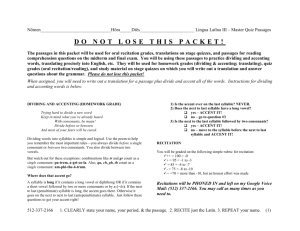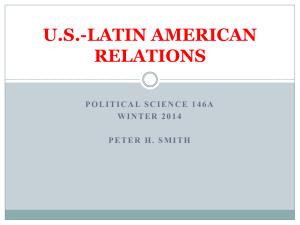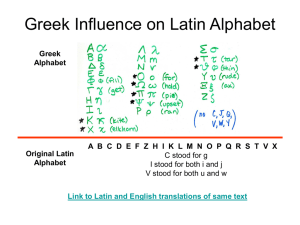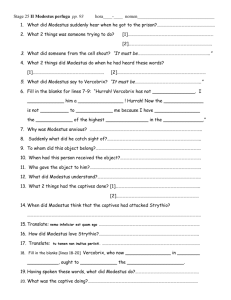OralRecitationLatinTWO
advertisement
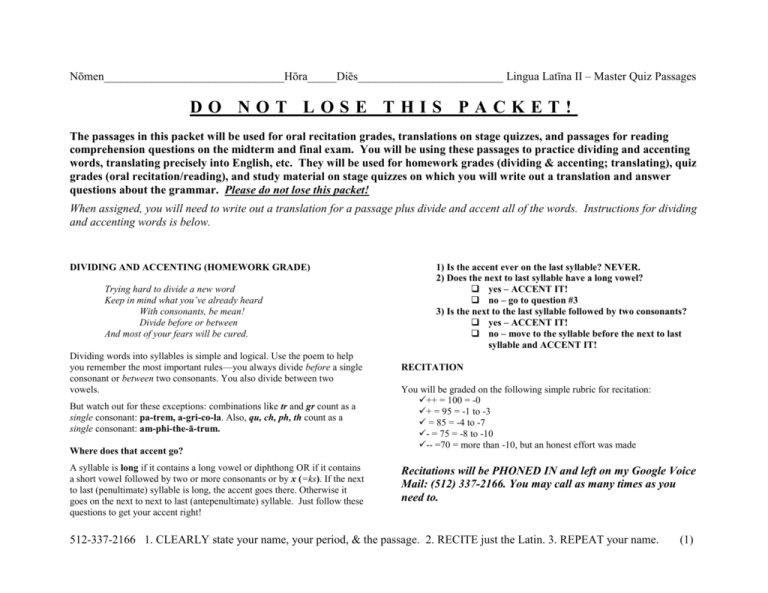
Nōmen_______________________________Hōra_____Diēs_________________________ Lingua Latīna II – Master Quiz Passages DO NOT LOSE THIS PACKET! The passages in this packet will be used for oral recitation grades, translations on stage quizzes, and passages for reading comprehension questions on the midterm and final exam. You will be using these passages to practice dividing and accenting words, translating precisely into English, etc. They will be used for homework grades (dividing & accenting; translating), quiz grades (oral recitation/reading), and study material on stage quizzes on which you will write out a translation and answer questions about the grammar. Please do not lose this packet! When assigned, you will need to write out a translation for a passage plus divide and accent all of the words. Instructions for dividing and accenting words is below. DIVIDING AND ACCENTING (HOMEWORK GRADE) Trying hard to divide a new word Keep in mind what you’ve already heard With consonants, be mean! Divide before or between And most of your fears will be cured. Dividing words into syllables is simple and logical. Use the poem to help you remember the most important rules—you always divide before a single consonant or between two consonants. You also divide between two vowels. But watch out for these exceptions: combinations like tr and gr count as a single consonant: pa-trem, a-gri-co-la. Also, qu, ch, ph, th count as a single consonant: am-phi-the-ā-trum. Where does that accent go? A syllable is long if it contains a long vowel or diphthong OR if it contains a short vowel followed by two or more consonants or by x (=ks). If the next to last (penultimate) syllable is long, the accent goes there. Otherwise it goes on the next to next to last (antepenultimate) syllable. Just follow these questions to get your accent right! 1) Is the accent ever on the last syllable? NEVER. 2) Does the next to last syllable have a long vowel? yes – ACCENT IT! no – go to question #3 3) Is the next to the last syllable followed by two consonants? yes – ACCENT IT! no – move to the syllable before the next to last syllable and ACCENT IT! RECITATION You will be graded on the following simple rubric for recitation: ++ = 100 = -0 + = 95 = -1 to -3 = 85 = -4 to -7 - = 75 = -8 to -10 -- =70 = more than -10, but an honest effort was made Recitations will be PHONED IN and left on my Google Voice Mail: (512) 337-2166. You may call as many times as you need to. 512-337-2166 1. CLEARLY state your name, your period, & the passage. 2. RECITE just the Latin. 3. REPEAT your name. (1) TRANSLATING (HOMEWORK AND ON STAGE QUIZZES) Learning how to translate a story into English accurately is a skill which demonstrates your ability to pay attention to details as well as to understand the big picture. As your Latin passages continue to become more complex, it will help you to follow these steps used for reading Latin. Please take special note of #6. RULES FOR READING 1. 2. 3. 4. 5. 6. Read the sentence or passage completely. In order to see all the words in context, reread as needed. While reading, register the word endings and their relationship to one another. Reread as needed. Now look up unfamiliar words. Reread as needed. Recognize word groups and read them in sequence. Reread as needed. Once a subordinate clause or phrase hasbegun, it must be completed before the rest of the sentence can proceed. Reread as needed. Translate only when you know how a sentence works and what it means. HOW THOSE RULES APPLY TO TRANSLATING What does it mean to “see the words in context”? Certain words, when next to other words, can mean different things. An accusative can be a direct object of the main verb or even of a participle, or, with a preposition in front of it, the object of the preposition. Why do I need to “register word endings or their relationship to one another”? Latin is an inflectional language—the function of a word in the sentence changes according to its ending as opposed to whether it is first or second or last. Words with accusative endings are often first in the sentence, but they are objects none the less. Latin also loves to “nest” phrases, especially those containing participles, with words of the same case on either side of an accusative, genitive, or perhaps a prepositional phrase. Why should I wait to look up unfamiliar words? Sometimes you can figure out the meaning of a word just because of its context in a paragraph. If you are rereading the sentence or paragraph, you may realize just from logic what the unknown word means. Why waste time looking up everything? What are “word groups”? Is reading in sequence really necessary if Latin is all about the endings anyway? Word groups and word order actually become more important in Latin as you learn more Latin. More often than not, recognizing “nested” phrases (especially with participles) will be the most important thing you learn to do this year, and if you are reading in word order you will find that they are easier to recognize. Then, if you combine this new skill with your knowledge of sentence patterns, your reading will steadily improve. What’s so important about where a subordinate clause is in the sentence? Why can’t you finish the sentence/main clause and then deal with the subordinate clause? In Latin, the subject will often appear before the subordinate clause and by the time you finish with the subordinate clause you may forget that the subject was even there. Therefore, it’s important to understand how Latin “nests” phrases and clauses. This will also prevent you from translating parts of the subordinate clause as part of the main clause and vice versa. Why do I need to keep rereading? (I want to be done already!) Sometimes it’s difficult to see word groups the first read through, especially if your mind is puzzling over the meaning of particular words. Rereading not only helps you to register word endings and see phrasing which you might have missed the first time, but it can also help you figure out the meaning of unfamiliar or forgotten words just from the context of what’s going on elsewhere in the sentence. Why can’t I start writing out a translation as I figure out each word? (Doesn’t it save me time to do it that way?) If you race to write down the meaning of the first word because you know what it means without registering endings, without seeing word groups and phrasing, and if that word was an object and not the subject, you would have begun the sentence totally wrong. After that, your brain will want to discount the significance of all other endings because you’ve predetermined incorrectly how the rest of the sentence will flow. Take the time to understand the whole sentence before writing anything down. In the long run, it will save you time and lead to fewer errors. 512-337-2166 1. CLEARLY state your name, your period, & the passage. 2. RECITE just the Latin. 3. REPEAT your name. (2) Stage 19: Aristō _________________________________________________________ Helena quoque, fīlia Aristōnis et Galatēae, _________________________________________________________ patrem vexat. multōs iuvenēs ad vīllam patris _________________________________________________________ invītat. amīcī Helenae sunt poētae. in vī llā _________________________________________________________ Aristōnis poētae versūs suōs recitant. Aristō _________________________________________________________ hōs versūs nōn amat, quod scurrīlēs sunt. s a e p e h ī p o ē t a e i n t e r s ē p u g n a n t . (Unit 2 140) _________________________________________________________ _________________________________________________________ _________________________________________________________ _________________________________________________________ Stage 20: remedium astrologī _________________________________________________________ servī per tōtam vīllam contendēbant, arāneās _________________________________________________________ quaerentēs; magnum clāmōrem t ollēbant. _________________________________________________________ Phormiō, postquam servī multās arāneās ad cubiculum tulērunt, in umerum dominī eās _________________________________________________________ _________________________________________________________ _________________________________________________________ collocāvit. astrologus ancillās lacrimantēs _________________________________________________________ v ī d i t , s e r v ō s q u e c l ā m a n t ē s a u d ī v i t . (Unit 2 163) _________________________________________________________ _________________________________________________________ 512-337-2166 1. CLEARLY state your name, your period, & the passage. 2. RECITE just the Latin. 3. REPEAT your name. (3) Stage 21: fōns sacer _________________________________________________________ multī aegrōtī, quī ex illō fonte aquam _________________________________________________________ bibērunt, posteā convaluērunt. architectus, _________________________________________________________ ā Rōmānīs missus, thermās maximās ibi exstrūxit. prope thermās stat templum deae _________________________________________________________ _________________________________________________________ _________________________________________________________ Sūlis, ā meīs fabrīs aedificātum. ego deam _________________________________________________________ saepe honōrāvī; nunc fortasse dea mē sānāre _________________________________________________________ potest. _________________________________________________________ (Unit 3 6) Stage 22: Vilbia _________________________________________________________ Vilbia et Rubria, pōcula sordida lavantēs, _________________________________________________________ in culīnā tabernae garriēbant. hae puellae _________________________________________________________ erant fīliae Latrōnis. Latrō, quī tabernam tenēbat, erat vir magnae dīligentiae sed _________________________________________________________ _________________________________________________________ _________________________________________________________ minimae prūdentiae. Latrō, culīnam ingressus, _________________________________________________________ p u e l l ā s c a s t ī g ā b a t . (Unit 3 30) _________________________________________________________ _________________________________________________________ 512-337-2166 1. CLEARLY state your name, your period, & the passage. 2. RECITE just the Latin. 3. REPEAT your name. (4) Stage 23: in thermīs _________________________________________________________ prope thermās erat templum, ā fabrīs Rōmānīs _________________________________________________________ aedificātum. rēx Cogidubnus cum multīs _________________________________________________________ prīncipibus servīsque prō templō sedēbat. Quīntus prope sellam rēgis stābat. rēgem _________________________________________________________ _________________________________________________________ _________________________________________________________ prīncipēsque manus armātōrum custōdiēbat. ... _________________________________________________________ Memor, togam praetextam gerēns, prope āram _________________________________________________________ stābat. _________________________________________________________ (Unit 3 46) Stage 24: in itinere _________________________________________________________ cum [Modestus et Strythiō] ad pontem _________________________________________________________ vēnissent, equus trānsīre noluit. “equus _________________________________________________________ trānsīre timet,” inquit Modestus. “Strythiō, tū prior trānsī!” cum Strythiō trānsiisset, equus _________________________________________________________ _________________________________________________________ _________________________________________________________ trānsīre etiam tum nōlēbat. Modestus igitur ex _________________________________________________________ equō dēscendit. cum dēscendisset, eq uus _________________________________________________________ statim trānsiit. _________________________________________________________ (Unit 3 66) 512-337-2166 1. CLEARLY state your name, your period, & the passage. 2. RECITE just the Latin. 3. REPEAT your name. (5) Stage 25: Modestus Custōs _________________________________________________________ Strythiō, quī ex trā cellam stābat, attonitus _________________________________________________________ erat. nesciēbat enim cūr Modestus clāmāret. _________________________________________________________ “Strythiō! Strythiō!” inquit. “claude portam cellae. nōbīs necesse est summā cum dīligentiā _________________________________________________________ _________________________________________________________ _________________________________________________________ Vercobrigem custōdīre. etiam arāneae eum _________________________________________________________ adiuvant!” Strythiō cum portam clausisset, _________________________________________________________ Modestum territum rogāvit quid accidis set. _________________________________________________________ (Unit 3 89) Stage 26: adventus Agricolae _________________________________________________________ tertiā hōrā Sīlānus mīlitēs in ōrdinēs longōs _________________________________________________________ īnstrūxit, ut Agricolam salūtārent. mīlitēs, _________________________________________________________ cum Agricolam castra intrantem vīdissent, magnum clāmōrem sustulērunt. “iō, Agricola! _________________________________________________________ _________________________________________________________ _________________________________________________________ iō, iō, Agricola!” tantus erat clāmor ut nēmō _________________________________________________________ iussa centuriōnum audīret. Agrico la ad _________________________________________________________ tribūnal prōcessit ut pauca dīceret. _________________________________________________________ (Unit 3 106) 512-337-2166 1. CLEARLY state your name, your period, & the passage. 2. RECITE just the Latin. 3. REPEAT your name. (6) Stage 27: sub horreō _________________________________________________________ centūriō Valerius, cum portās cellārum apertās _________________________________________________________ carceremque dēsertum vīdisset, īrātissimus _________________________________________________________ erat. mīlitibus imperāvit ut Modestum et Strythiōnem caperent. mīlitēs tamen, _________________________________________________________ _________________________________________________________ _________________________________________________________ quamquam per tōta castra quaerēbant, eōs _________________________________________________________ invenīre nōn poterant. illī duōs diēs manēbant _________________________________________________________ cēlātī. _________________________________________________________ (Unit 3 126) Stage 28: testāmentum _________________________________________________________ nam prīncipēs Rēgnēnsium mē saepe _________________________________________________________ vexāvērunt. aliī, spē praedae adductī, inter sē _________________________________________________________ pugnāvērunt; aliī īnsāniā affectī, sēditiōnem contrā Rōmānōs facere temptāvērunt. ... dō _________________________________________________________ _________________________________________________________ _________________________________________________________ lēgō Cn. Iūliō Agricolae statuam meam, ā _________________________________________________________ fabrō Britannicō factam. sīc Agricola mē per _________________________________________________________ tōtam vītam in memoriā habēre potest. _________________________________________________________ (Unit 3 145) 512-337-2166 1. CLEARLY state your name, your period, & the passage. 2. RECITE just the Latin. 3. REPEAT your name. (7) Stage 29: nox _________________________________________________________ magnīs in domibus, ubi dīvitēs habitābant, _________________________________________________________ cēnae splendidae cōnsūmēbantur. cibus _________________________________________________________ sūmptuōsus ā servīs offerēbātur; vīnum optimum ab ancillīs fundēbātur; carmina ā _________________________________________________________ _________________________________________________________ _________________________________________________________ citharoedīs perītissimīs cantābantur. in altīs _________________________________________________________ autem īnsulīs, nūllae cēnae splendidae _________________________________________________________ cōnsumēbantur, nūllī citharoedī audiēbantur. _________________________________________________________ (Unit 3 169) Stage 30: dignitās _________________________________________________________ cīvēs Rōmānī, postquam arcus ab Imperātōre _________________________________________________________ dēdicātus est, quattuor diēs fēstōs _________________________________________________________ celebrāvērunt. templa vīsitābant ut dīs grātiās _________________________________________________________ agerent; Circum Maximum cotīdiē complēbant ut lūdōs magnificōs ā cōnsulibus ēditōs _________________________________________________________ _________________________________________________________ _________________________________________________________ spectārent; ad arcum ipsum conveniēbant ut _________________________________________________________ figūrās in eō sculptās īnspicerent. _________________________________________________________ (Unit 3 193) 512-337-2166 1. CLEARLY state your name, your period, & the passage. 2. RECITE just the Latin. 3. REPEAT your name. (8) Phone-In Instructions 1. Call 512-337-2166 (google voicemail) any time school is not in session. (Otherwise, I may answer it and you’ll have to do the recitation live!) 2. Say your first and last name clearly and what period you have Latin. 3. Read the assigned passage to the best of your ability. 4. Repeat your first and last name and what period you have Latin, in case it was unclear the first time. 5. Call as many times as you need to if you mess up or don’t feel you did your best. 512-337-2166 1. CLEARLY state your name, your period, & the passage. 2. RECITE just the Latin. 3. REPEAT your name. (9)
